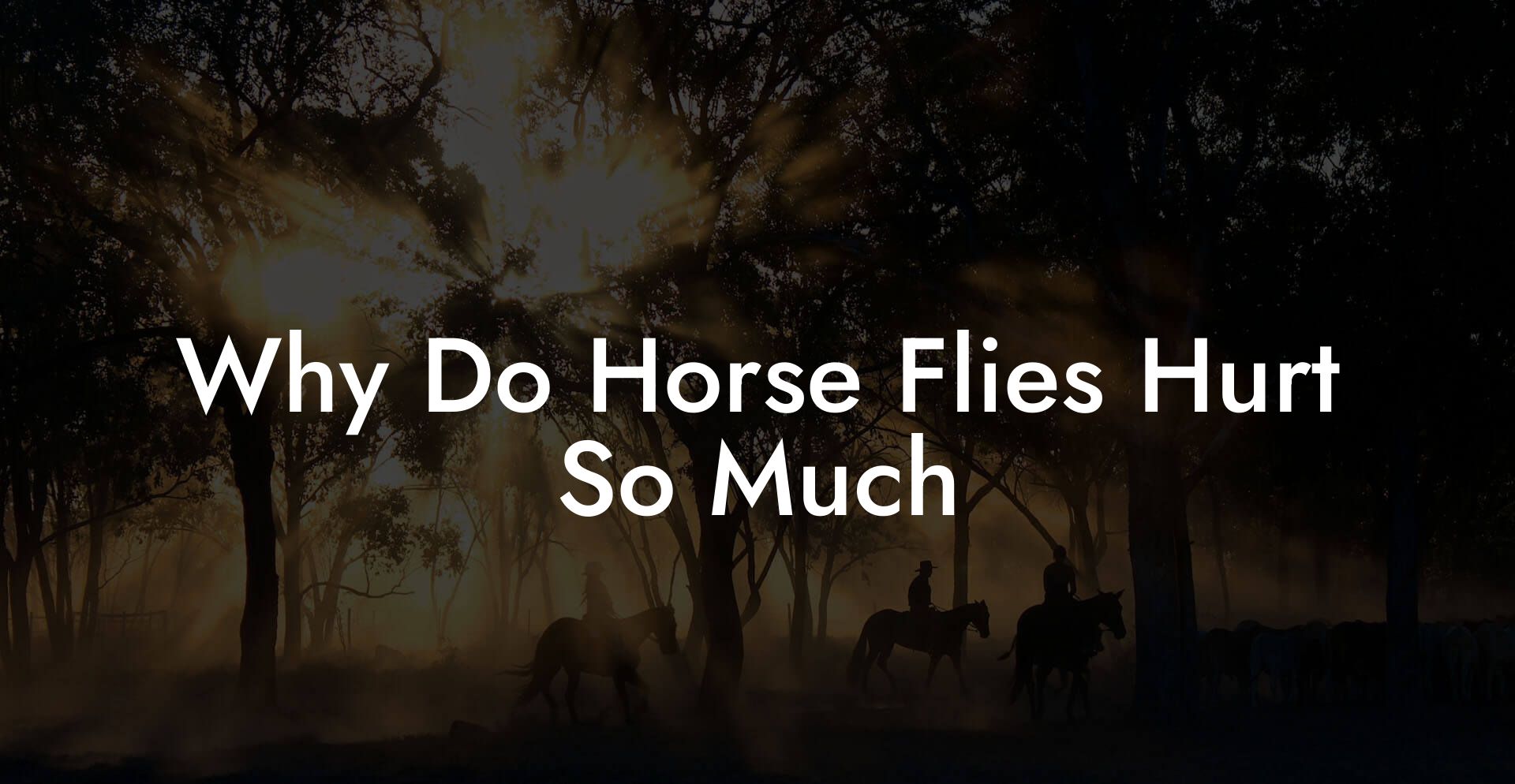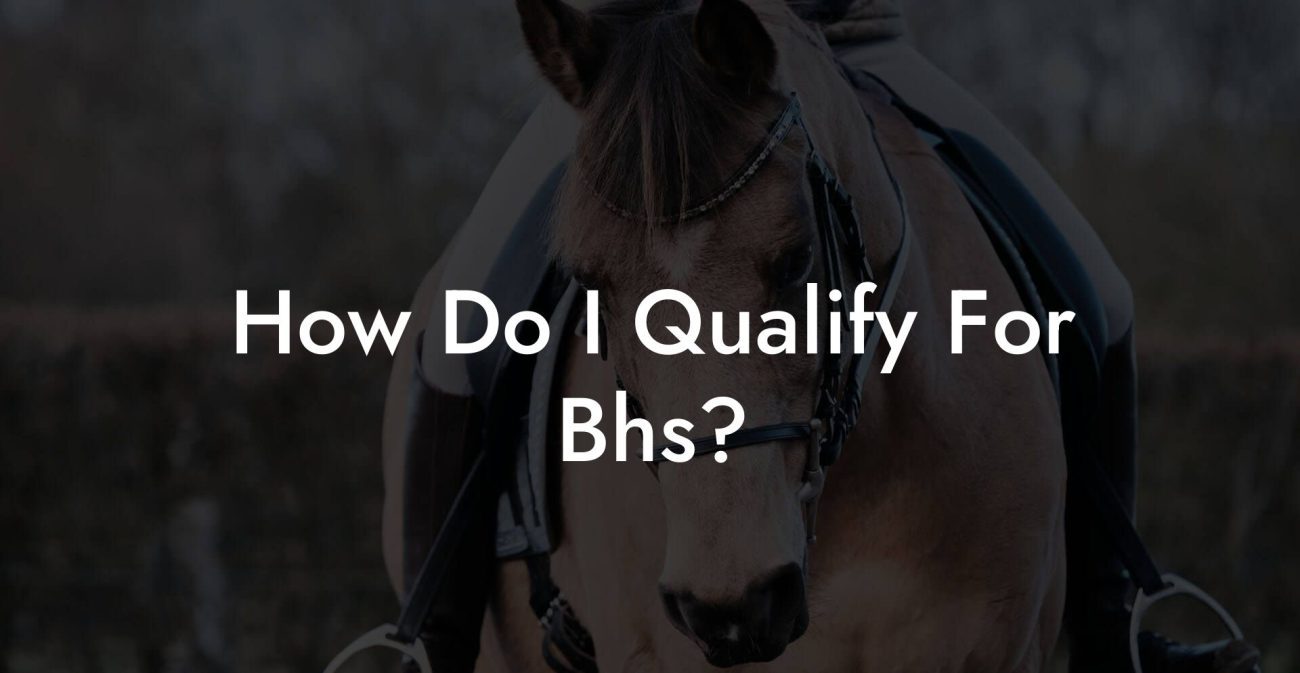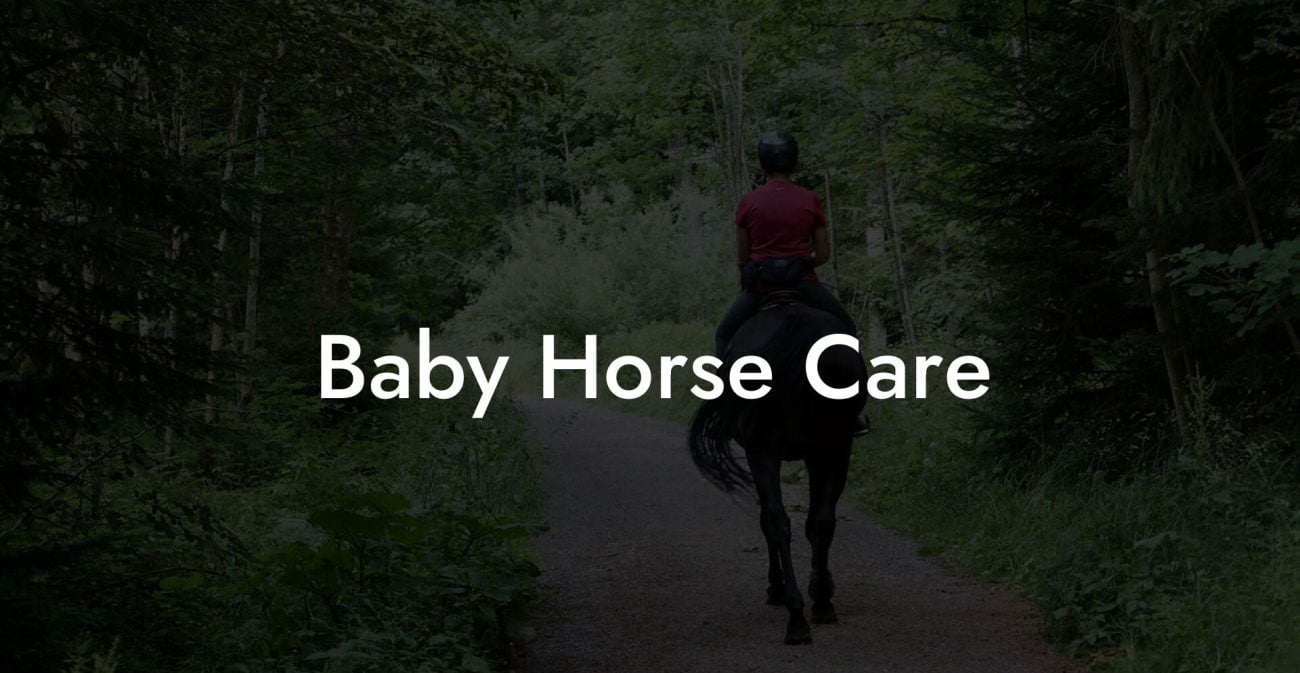Horse flies are nothing short of nature’s tiny, relentless ninjas, except instead of throwing shurikens, they deliver a venomous jab that leaves you (or your beloved horse) questioning every life choice. Ever wondered why these pesky insects cause such a fiery reaction? Buckle up, because we’re about to dive into the painful, perplexing world of horse fly bites and why they hurt so darn much.
Quick Links to Useful Sections
- The Unforgiving Sting: What Makes Horse Fly Bites So Painful?
- Horse Fly Anatomy: Tiny Insects, Big Impact
- The Science Behind the Sting: An Inflammatory Explosion
- Equine vs. Human: The Battle of the Bites
- health Risks Beyond the Pain: Why Horse Fly Bites Matter
- Strategies for Prevention: Keeping Horse Flies at Bay
- Environmental Control
- Repellents and Insecticides
- Protective Gear
- Immediate Care: What To Do When You’re Bitten
- DIY Tricks and Tech for a Fly-Free Experience
- Gadgets and Gear
- Homemade Solutions
- Environmental Considerations: Understanding and Respecting Nature’s Balance
- Integrative Approaches for Comprehensive Horse and Human Care
- Holistic Animal Care
- Mindful Self-Care and Stress Relief
- Resources and Community Support: Your Next Steps
- Frequently Asked Questions About Horse Fly Bites
- Embark on a Journey to Better Horse Health and Comfort
The Unforgiving Sting: What Makes Horse Fly Bites So Painful?
It all starts with a seemingly innocent horse fly landing on your horse’s flank or even your arm. But don’t let their unassuming presence fool you, their bite is engineered to be excruciating. Unlike many biting insects that simply pierce the skin, horse flies have evolved a sophisticated mechanism that involves slicing through the skin with razor-sharp mouthparts. This cutting action not only wounds but also triggers a heightened inflammatory response, making the bite ache like an overplayed indie track on your worst day.
When a horse fly bites, its mandibles work in tandem to create a feeding channel that allows it to suck blood while injecting a cocktail of saliva laced with anticoagulants and toxins. This mixture prevents immediate clotting and intensifies the pain, swelling, and irritation. For our four-legged friends and two-legged admirers alike, the aftermath includes a red, tender welt, and a vivid reminder that nature rarely does anything halfway.
In simple terms, horse fly bites hurt so much because their bite isn’t just a passive nip; it’s an active, pain-inducing assault on your body’s defenses. Your immediate body response? A flood of histamines and inflammatory chemicals that practically set off a firework show of discomfort on the spot.
Horse Fly Anatomy: Tiny Insects, Big Impact
To fully appreciate the torment of a horse fly bite, you need to know a bit about these critters’ anatomy. Horse flies belong to the family Tabanidae, and they are equipped with several specialized features that make them super-efficient bloodsuckers:
- Cutting Mouthparts: Unlike mosquitoes that use a needle-like proboscis, horse flies have scissor-like mandibles that slice through the skin, causing a more severe injury.
- Robust Eyes: Their compound eyes are often a kaleidoscope of colors and patterns, a trait that not only dazzles but also helps them detect movement from afar.
- Powerful Flight: These flies are agile fliers, capable of rapid movements that allow them to evade swats and settle in for their next invasive snack.
- Salivary Mix: Laden with toxins and anticoagulants, their saliva plays a devilish role in preventing blood from clotting immediately, ensuring a prolonged feeding session.
Knowing these facts, it’s no wonder that the bite of a horse fly is as infamous as that one friend who never stops talking, annoying, unavoidable, and painfully memorable.
The Science Behind the Sting: An Inflammatory Explosion
When a horse fly sinks its teeth (or rather, blades) into the skin, what follows is nothing short of a biochemical riot. The body, ever the overachiever, launches an immune response that unleashes a flurry of histamines and inflammatory mediators. These chemical messengers increase blood flow to the area, leading to swelling, redness, and that inevitable burning sensation.
Think of the bite as a mini emergency broadcast system: your immune cells are alerted, the inflammatory process speeds up, and pain receptors are supercharged to sound off an alarm. For your horse, this means temporary discomfort and potential agitation; for you, it’s a reminder to double-check your horse care kit for any soothing remedies.
Recent research has also hinted that the toxins in horse fly saliva might have evolved to amplify this response, ensuring that the host remains distracted and less mobile, making it easier for the fly to feast in peace. The result? A bite that’s not just a fleeting nuisance but a full-scale inflammatory event.
Equine vs. Human: The Battle of the Bites
Whether you’re a horse owner or simply a curious human, the bitter truth is that both species share similar frustrations when it comes to horse fly bites. For horses, the bites can interfere with their comfort and behavior. A horse that’s constantly swatting or showing signs of irritation might compromise its performance or even its general well-being.
Humans, particularly those who work closely with their horses in fields or pastures, can also be subject to these painful encounters. The severity of the reaction varies from person to person, but the universal rule remains: once bitten by a horse fly, you’re in for a ride that’s far from pleasant.
Interestingly, while our equine companions tend to have a more pronounced physical reaction due to their thicker hides and communal grooming habits, humans often experience a mix of curiosity, frustration, and an adrenaline rush to find the fastest remedy. It’s a battle of biology, one where the horse fly emerges victorious, if only for a few moments of painful glory.
health Risks Beyond the Pain: Why Horse Fly Bites Matter
Beyond the immediate searing pain and swelling, horse fly bites can sometimes lead to complications that raise the stakes higher than a rodeo showdown. While severe allergic reactions are rare, they are not unheard of, especially with repeated exposures. The bite sites can also become infected, leaving your horse or yourself vulnerable to secondary bacterial intrusions.
For horses, skin infections can develop into larger issues if left untreated, possibly leading to compromised coat condition or even affecting their overall performance. In humans, an untreated bite may escalate into cellulitis or other skin infections, particularly if the wound is scratched or irritated further.
Additionally, in some parts of the world, horse flies are suspected of playing a role in the transmission of parasites and diseases that can affect both animals and people. While not every bite results in such dire consequences, the risks emphasize why preventive measures and prompt treatment are paramount for anyone who spends time near these relentless biters.
Strategies for Prevention: Keeping Horse Flies at Bay
Prevention is always better than cure, especially when it comes to avoiding the wrath of horse flies. Whether you’re managing a stable full of majestic horses or simply enjoying a scenic countryside ride, there are several effective strategies to minimize the chances of getting bitten:
Environmental Control
Start by understanding that horse flies thrive in specific environments, near water sources, in humid areas, and during the warmer months. Installing fans, using fly traps, and maintaining a clean, dry environment around stables can go a long way in reducing their numbers.
Repellents and Insecticides
Modern repellents aren’t just for the overly cautious. There are many products designed specifically to deter horse flies without harsh chemicals that could harm your horse’s skin or coat. Natural options like essential oil blends, think eucalyptus, lavender, or citronella, can be effective, while veterinarian-approved insecticides provide an extra layer of defense.
Protective Gear
When working on your horse or spending extended time in fly-prone areas, protective clothing is your friend. Lightweight breathable fabrics, netted helmets, and even specially designed fly masks for horses can minimize exposure and keep these pests at arm’s length.
The key is to adopt a multi-pronged approach that combines environmental management, proven repellents, and practical protective measures. By doing so, you not only safeguard your horse’s comfort but also create a more enjoyable and less itchy experience for yourself.
Immediate Care: What To Do When You’re Bitten
Despite your best preventive measures, there may come a time when a horse fly bite happens, either on you or your horse. The first step in managing the situation is to stay calm and assess the extent of the bite.
For both horses and humans, immediate care should focus on reducing inflammation and preventing infection. Rinse the bite area with clean water and a gentle soap. Applying a cold compress can help numb the pain and minimize swelling. In cases where the bite is particularly bothersome, over-the-counter antihistamines or anti-inflammatory medications might be helpful, though consulting with a vet or doctor is always the best course of action.
Natural remedies also have their place in the recovery process. Aloe vera gel, witch hazel, or even a dab of tea tree oil can work wonders as a soothing antiseptic. Remember to monitor the bite area for signs of infection (increased redness, pus, or excessive swelling) and seek professional help if the condition worsens.
The goal is to treat the bite early to prevent prolonged discomfort or further complications, ensuring that you and your horse can get back to enjoying the outdoors without a cloud of irritation looming overhead.
DIY Tricks and Tech for a Fly-Free Experience
In today’s tech-savvy world, being proactive against horse flies isn’t just about slapping on insect repellent and hoping for the best. A mix of creativity, technology, and a little bit of good old-fashioned know-how can transform your battle against these winged warriors.
Gadgets and Gear
Innovative gadgets such as automated fly traps and portable electric zappers are gaining popularity among both horse owners and outdoor enthusiasts. These devices are designed to lure in and eliminate horse flies without harming other beneficial insects (or your peaceful evening ride).
There are also apps available that help you track local insect activity. By staying informed about peak fly conditions, you can schedule your horse outings during times when the bugs are least active, proving that sometimes knowledge really is power.
Homemade Solutions
For those of you who love a DIY challenge, crafting your own fly traps using simple household items can be surprisingly effective. A mix of sugar, water, and vinegar in a shallow container can lure horse flies in, trapping them for easy disposal. It’s an eco-friendly, cost-effective solution that brings a touch of ingenuity to the age-old battle against pesky insects.
Whether you’re opting for high-tech gadgets or homemade remedies, remember that innovation and persistence are key. It’s about outsmarting nature’s tiny tormentors and reclaiming your space, one fly at a time.
Environmental Considerations: Understanding and Respecting Nature’s Balance
While horse flies may seem like nothing more than unwelcome pests, they’re actually an integral part of the ecosystem. Their presence serves as a reminder that nature operates on a delicate balance between predators and prey. Horse flies are attracted to large mammals because they provide a steady source of blood meals, but they also serve as food for birds, bats, and other insectivores.
This intricate cycle means that outright eradication isn’t a realistic, or even desirable, goal. Instead, the smartest approach is to manage their presence to minimize discomfort without upsetting the natural order. By incorporating eco-friendly management techniques and respecting the environmental roles horse flies play, you become part of a solution that benefits all species involved.
In the grand scheme of things, understanding that even painful bites have their purpose can transform your perspective. It’s a reminder that every creature, no matter how annoying, is playing its part in the symphony of life.
Integrative Approaches for Comprehensive Horse and Human Care
Sometimes, the long-term solution lies in an integrative approach that not only minimizes the immediate pain but also supports overall wellbeing for both you and your horse. This isn’t just about treating a bite; it’s about enhancing your overall resilience against future encounters.
Holistic Animal Care
For your equine partner, regular grooming, a balanced diet, and a well-maintained living environment all contribute to a robust defense against irritants like horse flies. Natural supplements designed to boost the skin’s barrier function, along with calming herbal remedies, can help maintain a healthy, more resilient coat.
Mindful Self-Care and Stress Relief
For humans, managing stress and ensuring a healthy immune response goes a long way in how you react to insect bites. Embracing mindfulness practices, exercising regularly, and ensuring proper sleep all help to create an internal environment that is less reactive to external irritants.
Integrative approaches that combine practical prevention with proactive health and lifestyle choices not only ease the sting of a horse fly bite but also contribute to long-term wellness and vitality, both for you and your horse.
Resources and Community Support: Your Next Steps
Navigating the challenges of horse fly bites can feel like a solo expedition, but you’re far from alone. Across social media platforms, equestrian communities, and local stables, there’s a wealth of shared experiences, creative solutions, and supportive advice available.
Consider joining dedicated forums, Facebook groups, or even local meet-ups where horse owners share tips on everything from natural repellents to innovative fly-trap designs. Veterinarians and equine specialists are also invaluable resources, don’t hesitate to schedule a consultation for professional recommendations tailored to your unique situation.
By tapping into these networks, you not only gain practical advice but also become part of a broader movement that champions holistic horse care. This community spirit ensures that even on the toughest days, you have a support system ready to help you reclaim the outdoors, free from the relentless bite of horse flies.
Frequently Asked Questions About Horse Fly Bites
Here are some of the most common questions we get asked about the notorious horse fly bite:
1. Why do horse fly bites hurt so much?
Horse flies have specially adapted mouthparts that slice through the skin, injecting saliva filled with toxins and anticoagulants. This not only causes immediate tissue damage but also triggers an intense inflammatory response, resulting in significant pain and swelling.
2. Can horse fly bites cause infections?
Yes, the open wounds from horse fly bites can become infected if bacteria enter the cut. Both horses and humans should be monitored for signs of infection, and proper wound care or veterinary guidance should be sought if symptoms worsen.
3. What are the best prevention methods for horse fly bites?
A combination of environmental control (reducing humidity and stagnant water), topical repellents, protective gear, and regular grooming of horses can all help minimize the risk of bites.
4. Are there natural or DIY remedies to soothe a horse fly bite?
Absolutely. Cold compresses, aloe vera, witch hazel, and diluted essential oils like tea tree or lavender can help reduce inflammation and provide immediate soothing relief.
5. Do horse flies bite year-round?
Horse flies are most active during the warmer months and in humid environments, though in some regions, they can be a problem throughout the year.
6. Can technology help in controlling horse flies?
Yes, modern gadgets like automated fly traps, electric zappers, and smartphone apps to track insect activity can be highly effective in managing and reducing horse fly populations.
7. How should I treat a severe reaction to a horse fly bite?
For severe reactions or signs of infection, seek professional medical or veterinary care immediately. Over-the-counter antihistamines and anti-inflammatory medications can help in milder cases.
8. Is there any long-term damage from repeated horse fly bites?
While most bites heal without complications, repeated irritation can lead to chronic skin conditions or stress-related issues, so it’s important to adopt effective preventive measures.
Embark on a Journey to Better Horse Health and Comfort
Facing the relentless assault of horse flies is an unavoidable part of life in the great outdoors. But with the right approach, armed with knowledge, humor, and a dash of proactive care, you can significantly mitigate their impact. From understanding the intricate details of their painful bite to deploying effective prevention techniques and embracing technology and DIY solutions, you’re now equipped to combat these formidable foes head-on.
Whether it’s caring for your horse with the utmost diligence or safeguarding your own comfort during countryside adventures, the journey to a fly-free existence is paved with smart choices and community support. As you integrate these strategies into your daily routine, remember that every step forward, no matter how small, is a victory in the battle against nature’s tiny tormentors.
Step into this challenge with confidence, lean on the community of like-minded horse enthusiasts, and explore innovative methods that not only alleviate pain but also enhance overall well-being. Your journey to empowered, comfortable horse care isn’t just about managing discomfort, it’s about thriving in harmony with the natural world, one fly-free day at a time.
Embrace the challenge, celebrate your progress, and let every well-defended moment be a reflection of your dedication to both your own comfort and the well-being of your equine partner. Here's to a future where the sting of horse flies is nothing more than a distant memory, and where every day outdoors is an adventure free from needless pain!













